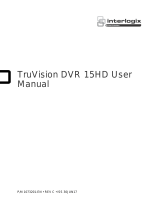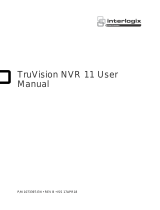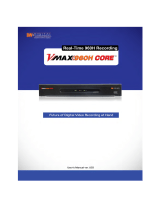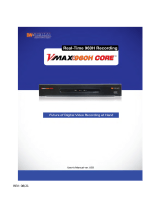
TruVision Recorder Operator Guide 3 / 4
Description
Bookmark management. Click to see the list of bookmarks
and their times.
Digital zoom. Zoom in to a selected part of the video image.
This option may not be available on all recorders.
Archive files.
Modify the forward and reverse skip times.
Call up the Search window to search for recorded video files
by time & date, events, bookmarks, and snapshots.
2. Playback bar: This bar displays how far playback of the recording
has progressed. It also indicates the type of recording.
3. Playback control toolbar.
Reverse play the recording. Click again to pause.
Stop playback. Timeline jumps back to 00:00 time (midnight).
Play or pause recording.
Reverse playback by the configured skip time (default is 30
seconds)
Fast forward playback by the configured skip time (default is
30 seconds).
Decrease playback speed. Options available are: ½ speed,
¼ speed, 1/8 speed, single frame.
Increase playback speed. Options available are: 2X speed,
4X speed, 8X speed, 32X speed.
Previous file/day/event recording.
Play next file/day recording in the search result.
4. Timeline: Allows you to jump forwards or backwards in time. The
timeline moves left (oldest video) to right (newest video). Click a
location on it for where you want playback to start.
In all-day playback the cursor shows the actual time. In search
playback, the cursor is a ball.
5. Recording type: Description of the color coding of recording types
that appear in the playback progress bar.
Green indicates continuous recording. Red indicates alarm/event
recording. Yellow indicates motion recording. Pale green indicates
manual recording. Pale blue indicates TextIn recording (depends on
recorder model). Magenta indicates VCA recording (depends on
recorder model).
6. Zoom in and out of the recording.
Instant playback
Use the quick access toolbar to quickly replay recorded video from the last five
minutes. Only one camera at a time can be selected. The default playback period
of 5 minutes cannot be changed.
To instantly replay recorded video:
1. In live view, left-click the mouse on the desired camera image. The quick
access toolbar appears. Click Instant Playback .
Playback starts immediately. The Instant Playback scroll bar appears under
the selected camera.
2. Click Pause on the toolbar to pause playback.
Click Play or click on the start of the bar to restart playback.
Click Stop to stop playback and return to live view.
24-hour playback
Use this option to play back recorded video from the last day. Playback starts at
midnight and runs for the 24-hour period. 24-hour playback is shown in full screen
view.
Note: This option is called “All-day Playback” on some recorders.
To play back video from the 24 hours:
1. In live view mode right-click the mouse on the desired camera image. Click
24-hour Playback in the mouse menu.
The playback window appears. By default, the camera is in full-screen
mode.
2. To select more than one camera for multiview playback or to select
playback from a different day, move the mouse to the right edge of the
screen. The camera/calendar panel appears. Check the desired cameras
and/or another day.
Playback starts immediately.
Note: A message appears if there are no recordings found during this
period.
3. Use the playback control toolbar to manually control playback.
4. Click Exit to return to live view.
– Or –
Right-click the mouse and click Exit in the mouse menu to return to the
previous screen.
Searching recorded video
1. In live view, right-click the mouse and select Advanced Search from the
menu.
– Or –
Press the Search button on the front panel.
2. In the Search menu, select one of the following search types:
Time & Date: Search all recorded video by selected cameras,
recording type, type of file protection (locked or
unlocked), and time period.
Event: Search only event recorded video. Files can be
searched by alarm inputs or motion detection.
Note: Only motion detection that has been recorded
as events will be listed in this search. Motion that has
been recorded as a non-event can be searched
under the Normal menu.
Bookmark: Search selected cameras only for recorded video
with bookmarks.
Snapshot: Search selected cameras only for recorded video
with snapshots.
Search results
A search will usually produce a list of files. The files are listed by camera, and
then for each camera by date and time. The most recent file is listed first. Only
one file can be played at a time. Click of a selected file to play it back.
Archiving recorded files
There are two ways to archive files:
• Quick Archive: Press the Archive button on the front panel to archive
recorded files quickly. The recorder downloads all the recorded files on the
unit to fill the available memory space on the media. This option is not
available via the mouse.
• Advanced Search: You can specify archiving settings such as a specific
time and date period, recording type, start and end times, as well as
cameras.
Quick Archive
To archive recorded video using Quick Archive:
1. Insert the backup device into the recorder.
If using a USB memory drive, insert the device into the USB port on the
front panel.








